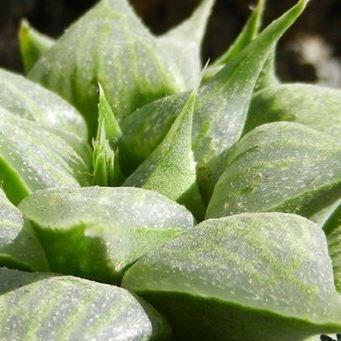
Haworthia magnifica var. Acuminata
Haworthia
Haworthia generally resemble miniature aloes, except in their flowers. They are popular garden and container plants. The plants can grow solitary or can be clump-forming. Their flowers are small, white and very similar between species. But their leaves show wide variations. 'Acuminata' has leaves that are long with a stiff truncate end. It slowly forms offsets, becoming an attractive clump in time. Individual plants can vary a lot depending on the care they've received.
Contributed by @Muzz67
-
Partial shade
-
Very little water
-
Frost Hardy: 23F (-5°C)
-
Free draining
Common name
Haworthia
Latin name
Haworthia magnifica var. Acuminata
type
Succulent
family
Asphodelaceae
ph
5.0 - 7.0 Acid - Neutral
Plant & bloom calendar
-
Best time to plant
-
When the plant will bloom
full grown dimensions
 0.08 M
0.10 M
0.08 M
0.10 M
Haworthia magnifica var. Acuminata
Haworthia generally resemble miniature aloes, except in their flowers. They are popular garden and container plants. The plants can grow solitary or can be clump-forming. Their flowers are small, white and very similar between species. But their leaves show wide variations. 'Acuminata' has leaves that are long with a stiff truncate end. It slowly forms offsets, becoming an attractive clump in time. Individual plants can vary a lot depending on the care they've received.
Flowering Season
From Mid Summer TO Mid Summer
Haworthia and Haworthiopsis will produce flowers, usually a few weeks after the "longest day" of the year, i.e. in Summer. However the flowers aren't very exciting, although because Haworthia and Haworthiopsis are very slow and compact plant not much happens visually during the year therefore the flowering period can be a welcome treat to show that your plant is actually "alive".
Planting Young Plants
From Early Spring TO Early Spring
When you re-pot your Haworthia or Haworthiopsis you can separate the offsets from the parent. Use a sharp knife and cut as close to the parent plant as possible, ensure the offset has some roots. Wait a day for the offset to dry slightly then pot up in a small container using a standard potting or cactus compost mix. Water and keep warm.























